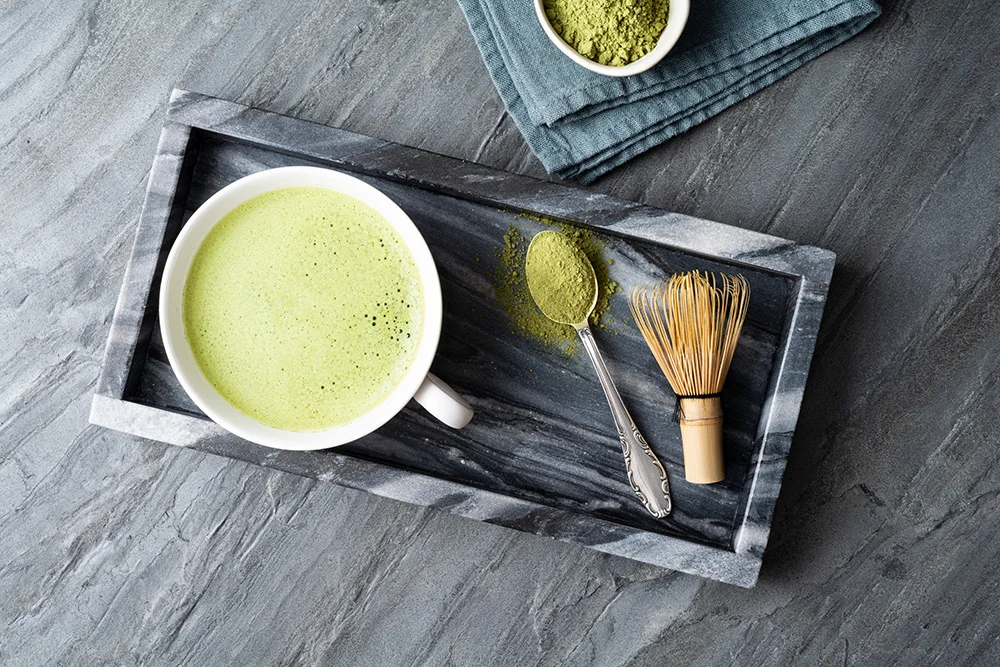
On their quest for better sleep, many people turn to enjoying a cup of hot tea or taking a supplement as part of their nightly regimen. Compounds like L-theanine can be found in tea and supplements, which many people may find beneficial for catching more z’s. Understanding the association between L-theanine and sleep can help you decide whether it makes sense for you to add it to your bedtime routine.
Note: The content on Sleepopolis is meant to be informative in nature, but it shouldn’t be taken as medical advice, and it shouldn’t take the place of medical advice and supervision from a trained professional. If you feel you may be suffering from any sleep disorder or medical condition, please see your healthcare provider immediately. Additionally, restrictions and regulations on supplements may vary by location. If you ever have any questions or concerns about a product you’re using, contact your doctor.
What is L-Theanine?
L-theanine is an amino acid.[1] Amino acids are compounds your body uses for processes like building proteins and enzymes, producing neurotransmitters and hormones, supporting immune function, and providing energy. [2] They are naturally found in foods.
Of the 20 amino acids, 9 are essential, meaning that your body cannot make them itself and must get them from the food you eat. The remaining 11 amino acids are nonessential, indicating that your body can produce them from cells and other amino acids. [2]
L-theanine is considered a nonessential amino acid. It’s not found in many commonly consumed foods except certain teas — it’s thought to be partially responsible for their umami flavor. L-theanine can also be found in supplemental form, which many people use because of its low prevalence in food sources. [3] [4]
How Does L-Theanine Work?
L-theanine helps certain neurotransmitters (brain messengers) work more effectively. [1] One of these is called GABA — or gamma-aminobutyric acid — which is involved in mood regulation and can have a calming effect.[5]
L-Theanine for Sleep
L-theanine may help with sleep thanks to its relaxing and stress-reducing properties. “L-theanine can help improve sleep by elevating levels of GABA, dopamine, and serotonin in the brain and inhibiting stress hormones. This promotes relaxation and reduces anxiety which can help people fall asleep faster and improve sleep quality,” says William Queale, M.D., internal medicine physician.
Here’s what research has shown regarding L-theanine for sleep:
- A 2022 randomized double-blind, placebo-controlled, cross-over study investigated the effects of a supplement containing 150mg alpha-s1-casein tryptic hydrolysate and 50mg L-theanine versus placebo on poor sleep patterns among 39 working adults. After 4 weeks of daily supplementation, the authors found that those who took the L-theanine-containing supplement experienced improved sleep latency and duration, increasing their total average sleeping time by 45 minutes compared to the placebo group.[6]
- A 2019 animal study found that a mixture of L-theanine and GABA, the neurotransmitter it activates, positively affected the ability to fall asleep and stay asleep. Researchers noted that the supplementation increased rapid eye movement (REM) sleep, which is the phase of sleep associated with dreaming and memory consolidation, and non-REM sleep, which are phases of deep sleep.[7]
- In a 2019 randomized controlled trial, 30 healthy adults were given 200 mg/day of L-theanine or placebo tablets for four weeks. Stress-related symptoms and sleep changes were monitored. The authors found that L-theanine supplementation helped improve sleep latency and disturbance, and reduced the amount of sleep medication required to help the individuals fall asleep.[8]
Though all the above information is compelling, research studies do have their limitations — it’s worth noting most of the existing studies are conducted with relatively small test populations. More research is needed to draw firm conclusions, but the existing studies are certainly promising!
Is L-Theanine in Green Tea?
L-theanine is found in the leaves of the Camellia sinensis plant, which is used to make black, white, oolong, and green tea. [1]
A serving of commercially prepared tea typically contains approximately 6.5 mg of L-theanine per gram of tea, and cup of green tea equals about 25 mg of L-theanine.[1] [9]
How to Use L-Theanine for Sleep
If you’re thinking of using L-theanine for sleep, it’s helpful to know how much to take and when. “The exact dose that you should take can depend on your needs — but generally speaking, 200 mg to 400 mg will get you to a sweet relaxation spot and support this sensation during your sleep,” says Dr. Kevin Huffman, DO, bariatric physician and founder of Ambari Nutrition. [10]
Recommendations on timing can vary by provider, however. Queale, for example, says to take it immediately before bed, while Huffman recommends 30 minutes to an hour before you hit the sheets. All that to say, you may need to try a few timing options to find your sweet spot.
“A healthcare practitioner should always be consulted before starting on L-theanine,” adds Queale. “This is especially true if you’re on other medication or are dealing with other health issues. Patience and consistency should be the keywords when using a supplement for sleep, since it might take some time to really be able to see the effects.”
An individual would need around 8 cups of tea to consume the 200 mg of L-theanine used in most studies to improve anxiety and sleep. But there are also plenty of L-theanine supplements, most of which provide 200 mg per serving.
Other Benefits of L-Theanine
In addition to reducing feelings of stress and anxiety to support sleep, L-theanine may offer these benefits:
- Improved brain function. L-theanine, combined with caffeine, may help improve concentration and reaction times during challenging mental tasks.[11]
- Immune function. L-theanine may help support the body’s natural immunity, and Green tea contains L-theanine and antioxidants that may help prevent infections like the flu. [12]
- Anti-tumor effects. Some studies have found that L-theanine can increase the anti-tumor activities of certain chemotherapy drugs. Research on L-theanine and cancer has largely focused on green tea consumption.[13]
Side Effects of L-Theanine
There are no major reported side effects of L-theanine when consumed in the amounts found in teas and most supplements. The FDA lists L-theanine as GRAS (generally recognized as safe) in doses of up to 250 mg per serving.[14]
Should I Talk With My Doctor About L-Theanine?
The L-theanine content of tea consumed in moderate, regular amounts is unlikely to pose health risks, but it’s always a good idea to speak with your healthcare provider before adding it in supplemental form to ensure it’s safe and appropriate. [15] This is especially true if you’re using it to help improve a complaint like anxiety or poor sleep.
FAQs
Does l-theanine help with sleep?
Research shows that l-theanine may help people fall asleep and stay asleep. To use l-theanine for sleep, experts recommend taking 200-400 mg 30 minutes to an hour before bed. However, it’s important to talk with your healthcare provider before adding l-theanine to your sleep routine, especially if you’re on other medication or are dealing with other health issues.
What is the best time to take l-theanine?
If you’re using l-theanine for its relaxation and sleep properties, try taking it 30 minutes to an hour before bed; however, you may have to experiment with the timing a bit, as every body is different.
Does l-theanine make you sleepy?
L-theanine may help with sleep — research shows that this amino acid may help people fall asleep and stay asleep more easily when used correctly. This is likely due to its relaxing and stress-reducing properties.
The Last Word From Sleepopolis
L-theanine is an amino acid found in tea. Although it’s not an essential amino acid, it has been shown to help improve feelings of stress and anxiety. This is what links L-Theanine and sleep. The easiest way to add it to your diet is to consume green, black, white, oolong tea, or take an L-theanine supplement. L-theanine is not known to pose significant risks, but it’s always best to speak with your doctor before adding any new supplement.
Sources
- Li MY, Liu HY, Wu DT, et al. L-Theanine: A Unique Functional Amino Acid in Tea (Camellia sinensis L.) With Multiple Health Benefits and Food Applications. Front Nutr. 2022;9. doi:10.3389/fnut.2022.853846
- Biochemistry, Essential Amino Acids – StatPearls – NCBI Bookshelf. Accessed March 10, 2024. https://www.ncbi.nlm.nih.gov/books/NBK557845/
- Uyanga VA, Oke EO, Amevor FK, et al. Functional roles of taurine, L-theanine, L-citrulline, and betaine during heat stress in poultry. Journal of Animal Science and Biotechnology. 2022;13(1):23. doi:10.1186/s40104-022-00675-6
- Williams J, Sergi D, McKune AJ, Georgousopoulou EN, Mellor DD, Naumovski N. The beneficial health effects of green tea amino acid l-theanine in animal models: Promises and prospects for human trials. Phytotherapy Research. 2019;33(3):571-583. doi:10.1002/ptr.6277
- Hepsomali P, Groeger JA, Nishihira J, Scholey A. Effects of Oral Gamma-Aminobutyric Acid (GABA) Administration on Stress and Sleep in Humans: A Systematic Review. Front Neurosci. 2020;14. doi:10.3389/fnins.2020.00923
- Thiagarajah K, Chee HP, Sit NW. Effect of Alpha-S1-Casein Tryptic Hydrolysate and L-Theanine on Poor Sleep Quality: A Double Blind, Randomized Placebo-Controlled Crossover Trial. Nutrients. 2022;14(3):652. doi:10.3390/nu14030652
- Kim S, Jo K, Hong KB, Han SH, Suh HJ. GABA and l-theanine mixture decreases sleep latency and improves NREM sleep. Pharmaceutical Biology. 2019;57(1):64-72. doi:10.1080/13880209.2018.1557698
- Hidese S, Ogawa S, Ota M, et al. Effects of L-Theanine Administration on Stress-Related Symptoms and Cognitive Functions in Healthy Adults: A Randomized Controlled Trial. Nutrients. 2019;11(10):2362. doi:10.3390/nu11102362
- Baba Y, Inagaki S, Nakagawa S, Kaneko T, Kobayashi M, Takihara T. Effects of l-Theanine on Cognitive Function in Middle-Aged and Older Subjects: A Randomized Placebo-Controlled Study. Journal of Medicinal Food. 2021;24(4):333-341. doi:10.1089/jmf.2020.4803
- Lopes Sakamoto F, Metzker Pereira Ribeiro R, Amador Bueno A, Oliveira Santos H. Psychotropic effects of L-theanine and its clinical properties: From the management of anxiety and stress to a potential use in schizophrenia. Pharmacological Research. 2019;147:104395. doi:10.1016/j.phrs.2019.104395
- Anas Sohail A, Ortiz F, Varghese T, et al. The Cognitive-Enhancing Outcomes of Caffeine and L-theanine: A Systematic Review. Cureus. Published online December 30, 2021. doi:10.7759/cureus.20828
- Chen S, Kang J, Zhu H, et al. L-Theanine and Immunity: A Review. Molecules. 2023;28(9):3846. doi:10.3390/molecules28093846
- Shojaei-Zarghani S, Rafraf M, Yari-Khosroushahi A. Theanine and cancer: A systematic review of the literature. Phytotherapy Research. 2021;35(9):4782-4794. doi:10.1002/ptr.7110
- GRAS Notices. Accessed March 10, 2024. https://www.cfsanappsexternal.fda.gov/scripts/fdcc/index.cfm?set=GrASNotices&id=209
- Evans M, McDonald AC, Xiong L, Crowley DC, Guthrie N. A Randomized, Triple-Blind, Placebo-Controlled, Crossover Study to Investigate the Efficacy of a Single Dose of AlphaWave® l-Theanine on Stress in a Healthy Adult Population. Neurol Ther. 2021;10(2):1061-1078. doi:10.1007/s40120-021-00284-x
William Queale, MD. Personal Interview. March 6, 2024.
Kevin Huffman, DO. Personal Interview. March 5, 2024.


























